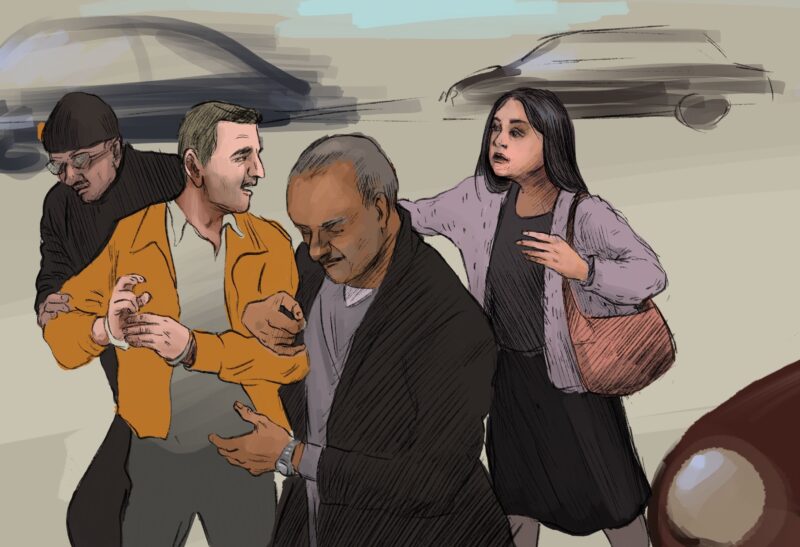There was a time when the profession of doctor or teacher was considered strictly men’s work; today nobody is surprised by woman health professionals.
But despite emancipation, taxi driver or car mechanic are still not very typical professions for women, even in European countries. And in the Caucasus, women who dream of becoming police, lawyers, politicians or of serving in the military can expect a lack of understanding and rebuffs if the men among her kin don’t like her choice.
After all, in the traditional society of the Caucasus, these elite professions are ‘unwomanly’! Not to speak of cobblers, taxi drivers, mechanics, and tractor operators: work that is not only firmly ‘men’s work’, but also, according to local perceptions, ‘rough’ and ‘coarse’.
As a result, a woman who has decided to move against the grain of societal prejudices can expect distrust from clients, lower wages, and a sexist attitude from male colleagues. But these brave individuals are out there all the same.
“My husband said it’s not ‘woman’s’ work… I became a cobbler after he died”
Cobbler Gayane Khambaryan – Armenia
Gayane Khambaryan is a cobbler in Yerevan. With this trade she supports her three-person family. The earnings are modest but Gayane is content with her work. She says that while her husband, also a cobbler, was alive, she always asked him to teach her, and that he refused her saying “you are a woman, take care of domestic affairs”.
“After his death, I taught myself anyway”, says Gayane.
There was a time when Gayane studied at the medical college in her home town of Vanadzor, but she didn’t complete her studies: she got married and moved with her family to Yerevan. Her dream of becoming a nurse didn’t come to pass. Now Gayane repairs shoes.
Her family didn’t like this very much, but when her husband had a heart attack, he could no longer work as he had before. Gayane had to take things on herself.
“At first it was very amusing. When clients came to get their repaired shoes, they would ask me to pass along their thanks to my husband, thinking that he had done the repairs”.
The work was hard, especially in the very beginning: “You might say all my fingers have been deformed, I’ve cut and even broken fingers on multiple occasions. But gradually my hands got used to it”.
After her husband’s death, Gayane continued to work as a cobbler. Her children weren’t opposed.
“They understood that this is the only way to feed the family. My son worked with me for a time, but then decided to go to Moscow and do the same there. And then the price of rent rose, he closed his workshop and went to make money singing in restaurants. He has a good voice. And holding a microphone isn’t so tough as working the whole day with a hammer”, laughs Gayane.
Gayane doesn’t really want for her children to do the same, but who knows how life will work out? “We have a wise proverb: a craftsman is hungry only ‘til midday”.
In Armenia almost every fifth person is officially unemployed, whereas Gayane is self-employed and proud of this: “It’s hard for women over thirty to find good work here. But there’s nobody to order me around. I decide myself when to open and close my shop”.
True, there are less orders. If previously Gayane received ten orders a day, now it’s two or three.
“I think the reason is the economic situation. If somebody has little money, they prefer to wear worn-out shoes. Especially during the warm part of the year. Our work season is generally autumn and winter. But with each year there are less and less orders”.
Gayane lives together with her daughter and granddaughter, supports the family herself: “I don’t make much, but we somehow get by. My maximum weekly income is 20,000 dram, this is about 50 dollars. But last week I made only 300 dram. And that was terrible”.
Gayane has good relations with her colleagues of the opposite sex. They respect her and are always ready to help. Of course, there do happen along clients who don’t take her seriously simply because she is a woman:
A person comes in, sees that a woman is sitting here and says straight to my face, you are a woman, how can I trust you? In such situations, I respond: I work here, if you don’t like it, good bye!
And others think that a woman will repair their shoes better and more carefully. Gayane was even offered a chance to teach her craft in school, but she turned this down: “It’s too much responsibility for me. And I’ve already gotten used to being my own boss”.
“People hang up when they hear a woman’s voice” Car mechanic Nushaba Agayeva – Azerbaijan
Nushaba Agayeva received medical training in Russia. She was married. Her two grown children – a son and daughter – are studying in the UK. Her father supports them and pays for their education. And Nushaba: she became a car mechanic five years ago, after her divorce. She used to fix engines, and these past three years she’s been working on transmissions. The work is physically demanding, but Nushaba says that modern technology makes it possible to overcome the difficulties and “not think that a woman is frail and there are some things of which she is incapable…”.
Nushaba has been interested in cars since childhood. She was taught to fix transmissions by a specialist named Sardar. They work together even now. “One of the most complex operations in our work is to remove the gearbox”, explains Nushaba.
When clients come to Sardar for such services, he sends them to Nushaba. “When clients see me, a woman, they are either embarrassed or feel awkward, as if to say, how will we speak to one another?”
And sometimes it’s the case that Nushaba is recommended as a good master of her craft, the client calls, but… “Upon hearing a woman’s voice, they apologize, they say I’m sorry, we were mistaken, and hang up. People are surprised when I say that I am the mechanic”.
Male clients’ attitudes are varied, admits Nushaba. Some treat her with respect, saying, ‘here is a woman who pursued such hard work.’
But the opposite also happens, they act inappropriately. “What can you do, everyone’s different…”
On the other hand, people feel more comfortable with a woman mechanic.
A woman comes with her husband or with one of her male relatives, because they think there will be an unfamiliar man in the shop. But upon seeing that a woman is working there, they relax and then come by themselves.
In the society of the Caucasus, it’s customary to defer to women and forgive them for mistakes even on the job, but Nushaba doesn’t need or want such a patronizing attitude, she says.
“Of course, I also sometimes make mistakes. But people don’t defer to me just because I’m a woman – impeccable work is demanded of us all. And I myself don’t think in such situations that I am a woman. What has that got to do with it? A client comes along, they should receive good service”.
The team is male, but our heroine says that work with men has taught her a lot.
“I began to learn from them how to be precise, how to keep my word, speak concretely, and, what can you do, I learned vulgarities… I myself feel that I’ve become more vulgar… but this is comfortable for me, there is something masculine in my character as well, and because of this there is no discomfort”.
And at the same time, Nushaba remains a woman – she cares about her haircut, her face, sets aside time for herself. Her hands are the only problem.
“Nothing works, neither a manicure nor any other means help. The gasoline and oil get into the skin. But all the same I look after my hair and face, try to look attractive”.
“Father didn’t allow me to become a lawyer, so I became a taxi driver” Maya Tsvitsivade – Taxi Driver – Georgia
Maya Tsivtsivadze is 43 years old. By education she is a financial expert, but has been working as a taxi driver for already a few years now.
Since childhood Maya has dreamed of becoming a lawyer. To this day she adores detective novels. But at that time people’s mentality in Georgia was different – women weren’t welcomed in this profession. Her controlling father forbade his daughter to even think about such a career. Maya entered the finance and economics department at university: her aunt was an accountant, and she was generally interested in economics.
She worked for the [CPSU] district committee, or raikom, then in an insurance company. And then the Soviet Union fell apart, the raikoms and insurance companies had no work either.
“Well, what’s to be done, I ran a private business. I got married”, sighs Maya.
Her personal life didn’t work out. After the divorce, Maya had to look after her children and mother alone. Maya didn’t dream of sitting behind the wheel of a taxi, she chose the work because she had no other option.
“Before, I baked pies to sell, but over time so many bakeries opened in the city that there were less and less orders. I had a car, and I thought, why not a taxi?”
But now she says that she’s satisfied with the unexpected turn.
“I like to talk with people, I love cars. This business captivated me. You meet various people, lawyers, doctors, politicians. It’s interesting to talk with them. The work is interesting, though also hard”.
Maya says that people aren’t accustomed to seeing a woman behind the wheel in a taxi: “When a passenger sits in the car, they see me and apologize for the mistake.
I end up having to calm them down, say no, you’re not mistaken, I’m a taxi driver. Women are supportive, whereas men are surprised and also yell, aaah, a woman driving a taxi!
***
Author: Gyunel Movlud Consultant from Armenia: Gayane Mkrtchyan Consultant from Georgia: Edita Badasyan



